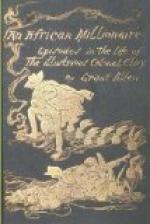“Another round?” the host asked, beaming.
“No, thank you,” Charles answered; “Mr. Coleyard’s inspirations come too pat for my taste. His luck beats mine. I retire from the game, Senator.”
Just at that moment a servant entered, bearing a salver, with a small note in an envelope. “For Mr. Coleyard,” he observed; “and the messenger said, urgent.”
Coleyard tore it open hurriedly. I could see he was agitated. His face grew white at once.
“I—I beg your pardon,” he said. “I—I must go back instantly. My wife is dangerously ill—quite a sudden attack. Forgive me, Senator. Sir Charles, you shall have your revenge to-morrow.”
It was clear that his voice faltered. We felt at least he was a man of feeling. He was obviously frightened. His coolness forsook him. He shook hands as in a dream, and rushed downstairs for his dust-coat. Almost as he closed the front door, a new guest entered, just missing him in the vestibule.
“Halloa, you men,” he said, “we’ve been taken in, do you know? It’s all over the Lotus. The man we made an honorary member of the club to-day is not Algernon Coleyard. He’s a blatant impostor. There’s a telegram come in on the tape to-night saying Algernon Coleyard is dangerously ill at his home in England.”
Charles gasped a violent gasp. “Colonel Clay!” he shouted, aloud. “And once more he’s done me. There’s not a moment to lose. After him, gentlemen! after him!”
Never before in our lives had we had such a close shave of catching and fixing the redoubtable swindler. We burst down the stairs in a body, and rushed out into Fifth Avenue. The pretended poet had only a hundred yards’ start of us, and he saw he was discovered. But he was an excellent runner. So was I, weight for age; and I dashed wildly after him. He turned round a corner; it proved to lead nowhere, and lost him time. He darted back again, madly. Delighted with the idea that I was capturing so famous a criminal, I redoubled my efforts—and came up with him, panting. He was wearing a light dust-coat. I seized it in my hands. “I’ve got you at last!” I cried; “Colonel Clay, I’ve got you!”
He turned and looked at me. “Ha, old Ten Per Cent!” he called out, struggling. “It’s you, then, is it? Never, never to you, sir!” And as he spoke, he somehow flung his arms straight out behind him, and let the dust-coat slip off, which it easily did, the sleeves being new and smoothly silk-lined. The suddenness of the movement threw me completely off my guard, and off my legs as well. I was clinging to the coat and holding him. As the support gave way I rolled over backward, in the mud of the street, and hurt my back seriously. As for Colonel Clay, with a nervous laugh, he bolted off at full speed in his evening coat, and vanished round a corner.
It was some seconds before I had sufficiently recovered my breath to pick myself up again, and examine my bruises. By this time Charles and the other pursuers had come up, and I explained my condition to them. Instead of commending me for my zeal in his cause—which had cost me a barked arm and a good evening suit—my brother-in-law remarked, with an unfeeling sneer, that when I had so nearly caught my man I might as well have held him.




